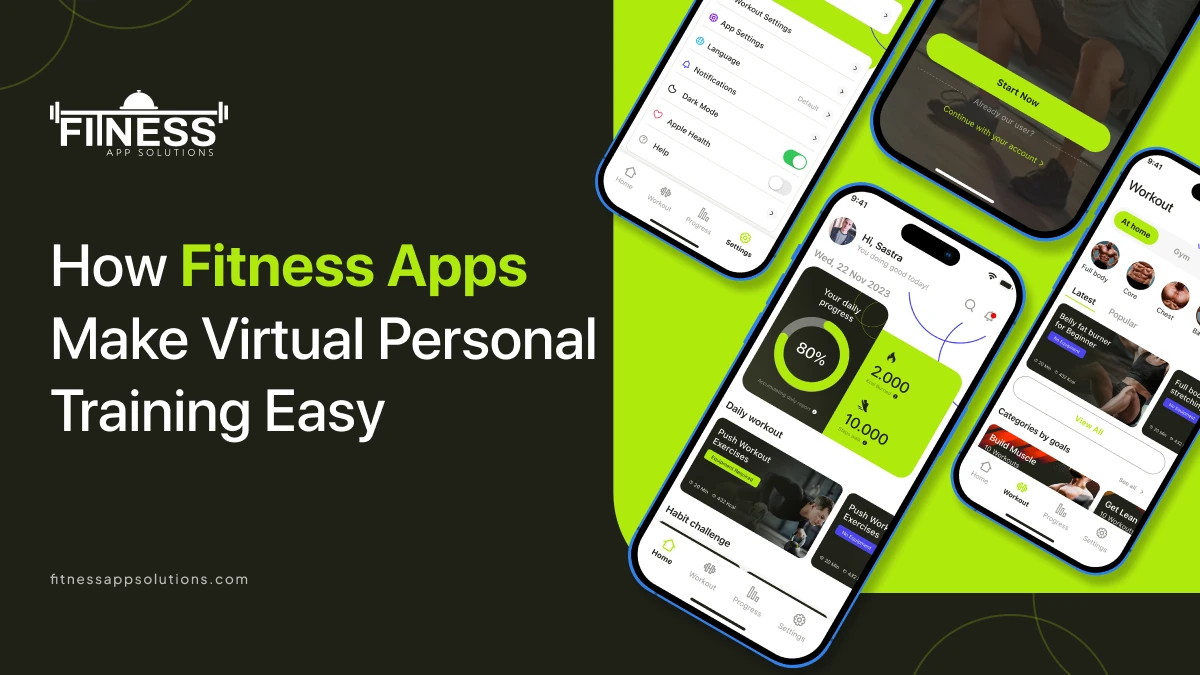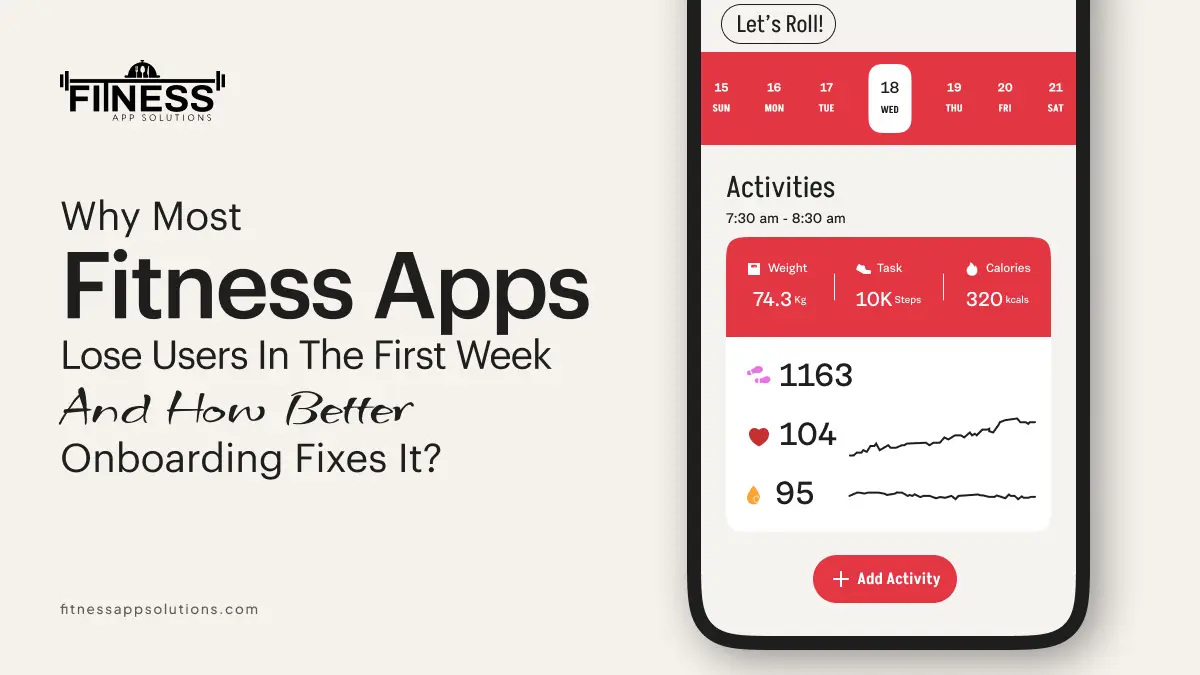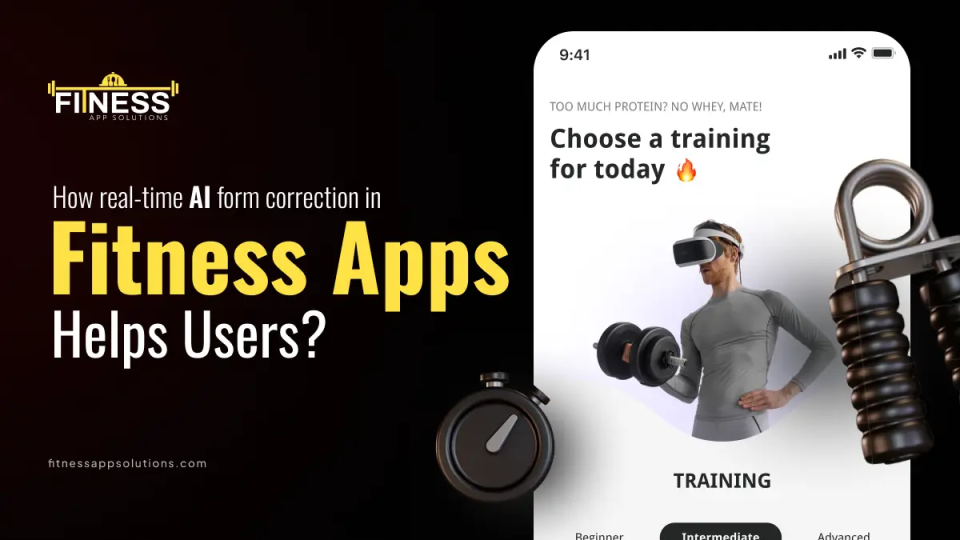Maintaining a consistent fitness routine can be challenging for people in current life scenario where everyone is occupied to ensure work-life balance. Due to this maintaining fitness has become an essential element for everyone. Most people seek advice & motivation from personal trainers but cannot afford regular face-to-face training sessions due to their busy schedules, geographical limitations, or insufficient funds. This is where virtual personal training via fitness apps has become a game-saver opportunity.
Fitness apps revolutionize the way individuals engage with personal training solutions by delivering expert guidance right on their mobile devices. These apps combine technology and fitness expertise to offer personalized workouts, track progress, provide real-time feedback & foster community support — all designed to make training more accessible, effective & enjoyable.
Many also integrate meal plan software for personal trainers, helping clients receive customized nutrition guidance alongside their workouts.
This blog explains how fitness apps make virtual personal training easy, their key features & the numerous benefits these digital platforms provide.
What are the Key Features of Fitness Apps?

Modern fitness apps are loaded with tools and functionalities that mimic & sometimes even enhance the experience of traditional personal training. Here are some of the key features that make these apps highly effective and user-friendly.
Custom Workout Plans
Without a doubt, the greatest value of virtual personal training lies in the way in which fitness apps create custom workout plans specific to a user’s fitness level, goals, likes & available equipment. Leveraging initial tests and algorithm-based customization, the apps provide workouts that evolve with you as you proceed on your training path, always challenging and protecting you from burnout or injury.
This degree of personalization helps users create better results through consideration of their unique needs rather than fitting into general routines.
Monitoring Progress and Analysis
Health apps allow users to monitor their progress in depth through various measures such as calories burned, exercise duration, heart rate, strength gain & flexibility. Visual analysis and dashboards allow it to be easily seen to track trends over time, mark milestones & areas of improvement.
This data-driven approach makes customers accountable & active, in addition to allowing trainers to adjust plans according to real performance feedback.
Interactive Feedback and Guidance
Leveraging video lessons, live classes, or AI coaches, fitness apps offer interactive guidance that simulates the personal trainer experience. It provides step-by-step feedback on form & technique for exercises, minimizing mistakes & injuries. Even certain apps offer real-time feedback through motion detection & machine learning to adjust your posture or recommend changes based on your real performance.
Accessibility and Convenience
Unlike traditional training with scheduling & physical presence, fitness apps provide anytime, anywhere access to workouts & trainer support. This ease of access is one of the primary reasons for their popularity. Whether at home, gym, or on the go, users can integrate effective training sessions into their lives.
Social Features and Support from the Community
Features of a community such as group challenges, leaderboards, sharing of workouts & forums for support create a social environment that many find motivating. Sharing of progress, milestones, and experiences fosters accountability & makes the workouts enjoyable.
These social features have a tendency to mimic the camaraderie & support found in the traditional gym & personal training environment.
What are the Benefits of Virtual Personal Training?

Virtual personal training via fitness apps has a number of benefits over conventional training techniques, making it a viable alternative or addition for most fitness enthusiasts. Some of the key benefits include:
Motivation
Regardless of whether it is in the form of regular notifications, achievement badges, or virtual coach motivation, fitness apps hold users’ attention & keep them motivated. Constant reminders and prompts ensure workout regularity, which is one of the key success factors in fitness.
Measurable improvement and positive reinforcement strengthen a rewarding cycle that keeps the users engaged with their fitness goals.
Cost-Effective
In-person personal trainers can be expensive to engage. Fitness apps offer many aspects of personal training at much lesser cost or even free. This makes expert guidance accessible to more individuals without a compromise in quality or result.
Personalization
Online personal training ensures exercises personalized only for you, your goals, your body type & your schedule with a much higher likelihood of success compared to one-size-fits-all fitness plans or group classes. This one-on-one approach operates to maximize effort & minimize unnecessary strain or risk of injury.
Convenience
Perhaps the biggest benefit of virtual personal training is that you no longer need to commute or plan your life around the gym’s schedule. Fitness apps enable you to choose when, where, and for how long you work out, making physical fitness more flexible & easier to integrate into life.
Scheduling Flexibility
Online personal training offers flexibility for clients to schedule workouts at their convenience, according to various work schedules, family commitments, or travel schedules. This enables individuals to be consistent in their workout routine without the stress of rigid scheduling.
Injury Prevention and Rehabilitation
A majority of the fitness applications contain injury prevention & rehabilitation workouts. Users can use specialized programs that have been designed for strengthening weak points, improving mobility, & recovering from injury, via proper technique and form.
Compatibility with Wearable Technology
Many fitness applications can sync with wearable technology such as fitness trackers and smartwatches. The syncing allows one to monitor their heart rate, calories burned & other vital signs in real time, providing a holistic view of their fitness exercise.
Personalized Nutrition Plans
Certain apps offer nutrition tracking & meal planning features, which allow users to complement their exercise routine with a proper diet. Personalized meal plans can make users’ fitness goals more realistic by making them eat right.
Reduced Gym Anxiety
The gym may be an intimidating environment for numerous individuals. Virtual personal training allows individuals to workout in the convenience of their home, reducing anxiety & enabling them to focus on their fitness minus the anxiety that comes with working out in a public gym.
Continuous Learning
Many fitness apps provide educational content, such as articles, videos & webinars, that allow users to learn more about fitness, nutrition & wellness. The continuous learning feature helps users to make informed decisions about their fitness and health journey.
Global Community
Online personal training software has a tendency to build a worldwide client community that can interact with each other, share their experiences, & motivate each other. The sense of belongingness may motivate & even lead to lifelong friendships, making exercise more enjoyable.
Conclusion
Fitness apps have transformed virtual personal training experience & accessibility. With a combination of high-tech & personalized fitness expertise, they are making professional-level training more accessible, affordable & enjoyable.
The personal training experiences offered through such apps, ranging from personalized workouts to progress tracking & social interaction, provide clients with everything they need to stay motivated & excel on their fitness journey.
No matter if you’re a newbie or seasoned athlete, finding the ultimate virtual personal trainer app can unlock new opportunities to realize your health & fitness goals quickly and confidently.
Frequently Asked Questions (FAQs)
1.What is virtual personal training?
Virtual personal training is a training method where users receive expert fitness guidance remotely through an app or online platform instead of meeting a trainer face-to-face.
2.How do fitness apps personalize workouts?
Fitness apps collect information about your fitness level, goals, available equipment & preferences to create tailored workout plans that evolve as you improve.
3.Are virtual personal trainers effective?
Yes, with features like real-time feedback, progress tracking & personalized coaching, virtual training can be just as effective as in-person sessions.
4.What are the benefits of using the best virtual personal trainer app?
Benefits include convenience, cost savings, personalized programming, motivation, social support & ability to train anywhere at any time.



